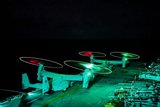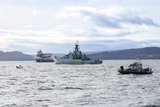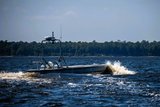As Operation Irini starts, the question is who will benefit?
The EU’s new maritime security mission, created to aid enforcing the UN arms embargo on Libya, officially stood up this week as the bloc shifts its focus to efforts prevent the trafficking of weapons into the crisis-hit North African state.
Libya has been wracked by civil war since the overthrow of Muammar Gaddafi in 2011, with multiple factions seeking political claims in the years since. Two main blocs are currently vying for power, the UN-backed Government of National Accord (GNA) in Tripoli and the Gen Khalifa Haftar-led LNA (Libyan National Army) faction.
Interestingly, two EU member states find themselves on
Already have an account? Log in
Want to keep reading this article?
More from Naval Warfare
-
![How the Anduril-HHI autonomous ship plan fits in with the US Navy’s MASC programme]()
How the Anduril-HHI autonomous ship plan fits in with the US Navy’s MASC programme
The new modular vessel is expected to be developed for both commercial and defence use, with a heavy focus on production speed and mission flexibility.
-
![Indo Pacific 2025: Autonomous systems reigned but can the Australian Defence Force afford it?]()
Indo Pacific 2025: Autonomous systems reigned but can the Australian Defence Force afford it?
Multiple autonomous systems and technologies were on display at this year’s Indo Pacific, but questions remain over how the Australian Department of Defence will balance the books.
-
![How the UK Royal Navy is powering up its hybrid fleet to combat new threats]()
How the UK Royal Navy is powering up its hybrid fleet to combat new threats
Since it announced its move towards a new “hybrid navy” earlier this year, the force has announced a number of new uncrewed technologies in the works.
-
![US and UK to begin Trident II D5 Increment 8 in October 2026]()
US and UK to begin Trident II D5 Increment 8 in October 2026
Trident II D5 Increment 8 will involve improvements to the shipboard navigation subsystem for the US Ohio and Columbia and the UK Dreadnought and Vanguard submarine classes.
-
![US Navy starts acquisition process for uncrewed maritime systems for support missions]()
US Navy starts acquisition process for uncrewed maritime systems for support missions
The USN is interested in uncrewed capabilities that can carry out explosive ordnance disposal, mine countermeasures, force protection, ISR and anti-submarine missions.






















